POSTERIOR ANALYTICS Read online
* * *
POSTERIOR ANALYTICS
by Aristotle
translated by G. R. G. Mure
This page copyright © 2001 Blackmask Online.
http://www.blackmask.com
Book I
1
2
3
4
5
6
7
8
9
10
11
12
13
14
15
16
17
18
19
20
21
22
23
24
25
26
27
28
29
30
31
32
33
34
Book II
1
2
3
4
5
6
7
8
9
10
11
12
13
14
15
16
17
18
19
* * *
Book I
1
ALL instruction given or received by way of argument proceeds from pre-existent knowledge. This becomes evident upon a survey of all the species of such instruction. The mathematical sciences and all other speculative disciplines are acquired in this way, and so are the two forms of dialectical reasoning, syllogistic and inductive; for each of these latter make use of old knowledge to impart new, the syllogism assuming an audience that accepts its premisses, induction exhibiting the universal as implicit in the clearly known particular. Again, the persuasion exerted by rhetorical arguments is in principle the same, since they use either example, a kind of induction, or enthymeme, a form of syllogism.
The pre-existent knowledge required is of two kinds. In some cases admission of the fact must be assumed, in others comprehension of the meaning of the term used, and sometimes both assumptions are essential. Thus, we assume that every predicate can be either truly affirmed or truly denied of any subject, and that 'triangle' means so and so; as regards 'unit' we have to make the double assumption of the meaning of the word and the existence of the thing. The reason is that these several objects are not equally obvious to us. Recognition of a truth may in some cases contain as factors both previous knowledge and also knowledge acquired simultaneously with that recognition-knowledge, this latter, of the particulars actually falling under the universal and therein already virtually known. For example, the student knew beforehand that the angles of every triangle are equal to two right angles; but it was only at the actual moment at which he was being led on to recognize this as true in the instance before him that he came to know 'this figure inscribed in the semicircle' to be a triangle. For some things (viz. the singulars finally reached which are not predicable of anything else as subject) are only learnt in this way, i.e. there is here no recognition through a middle of a minor term as subject to a major. Before he was led on to recognition or before he actually drew a conclusion, we should perhaps say that in a manner he knew, in a manner not.
If he did not in an unqualified sense of the term know the existence of this triangle, how could he know without qualification that its angles were equal to two right angles? No: clearly he knows not without qualification but only in the sense that he knows universally. If this distinction is not drawn, we are faced with the dilemma in the Meno: either a man will learn nothing or what he already knows; for we cannot accept the solution which some people offer. A man is asked, 'Do you, or do you not, know that every pair is even?' He says he does know it. The questioner then produces a particular pair, of the existence, and so a fortiori of the evenness, of which he was unaware. The solution which some people offer is to assert that they do not know that every pair is even, but only that everything which they know to be a pair is even: yet what they know to be even is that of which they have demonstrated evenness, i.e. what they made the subject of their premiss, viz. not merely every triangle or number which they know to be such, but any and every number or triangle without reservation. For no premiss is ever couched in the form 'every number which you know to be such', or 'every rectilinear figure which you know to be such': the predicate is always construed as applicable to any and every instance of the thing. On the other hand, I imagine there is nothing to prevent a man in one sense knowing what he is learning, in another not knowing it. The strange thing would be, not if in some sense he knew what he was learning, but if he were to know it in that precise sense and manner in which he was learning it.
2
We suppose ourselves to possess unqualified scientific knowledge of a thing, as opposed to knowing it in the accidental way in which the sophist knows, when we think that we know the cause on which the fact depends, as the cause of that fact and of no other, and, further, that the fact could not be other than it is. Now that scientific knowing is something of this sort is evident-witness both those who falsely claim it and those who actually possess it, since the former merely imagine themselves to be, while the latter are also actually, in the condition described. Consequently the proper object of unqualified scientific knowledge is something which cannot be other than it is.
There may be another manner of knowing as well-that will be discussed later. What I now assert is that at all events we do know by demonstration. By demonstration I mean a syllogism productive of scientific knowledge, a syllogism, that is, the grasp of which is eo ipso such knowledge. Assuming then that my thesis as to the nature of scientific knowing is correct, the premisses of demonstrated knowledge must be true, primary, immediate, better known than and prior to the conclusion, which is further related to them as effect to cause. Unless these conditions are satisfied, the basic truths will not be 'appropriate' to the conclusion. Syllogism there may indeed be without these conditions, but such syllogism, not being productive of scientific knowledge, will not be demonstration. The premisses must be true: for that which is non-existent cannot be known-we cannot know, e.g. that the diagonal of a square is commensurate with its side. The premisses must be primary and indemonstrable; otherwise they will require demonstration in order to be known, since to have knowledge, if it be not accidental knowledge, of things which are demonstrable, means precisely to have a demonstration of them. The premisses must be the causes of the conclusion, better known than it, and prior to it; its causes, since we possess scientific knowledge of a thing only when we know its cause; prior, in order to be causes; antecedently known, this antecedent knowledge being not our mere understanding of the meaning, but knowledge of the fact as well. Now 'prior' and 'better known' are ambiguous terms, for there is a difference between what is prior and better known in the order of being and what is prior and better known to man. I mean that objects nearer to sense are prior and better known to man; objects without qualification prior and better known are those further from sense. Now the most universal causes are furthest from sense and particular causes are nearest to sense, and they are thus exactly opposed to one another. In saying that the premisses of demonstrated knowledge must be primary, I mean that they must be the 'appropriate' basic truths, for I identify primary premiss and basic truth. A 'basic truth' in a demonstration is an immediate proposition. An immediate proposition is one which has no other proposition prior to it. A proposition is either part of an enunciation, i.e. it predicates a single attribute of a single subject. If a proposition is dialectical, it assumes either part indifferently; if it is demonstrative, it lays down one part to the definite exclusi
on of the other because that part is true. The term 'enunciation' denotes either part of a contradiction indifferently. A contradiction is an opposition which of its own nature excludes a middle. The part of a contradiction which conjoins a predicate with a subject is an affirmation; the part disjoining them is a negation. I call an immediate basic truth of syllogism a 'thesis' when, though it is not susceptible of proof by the teacher, yet ignorance of it does not constitute a total bar to progress on the part of the pupil: one which the pupil must know if he is to learn anything whatever is an axiom. I call it an axiom because there are such truths and we give them the name of axioms par excellence. If a thesis assumes one part or the other of an enunciation, i.e. asserts either the existence or the non-existence of a subject, it is a hypothesis; if it does not so assert, it is a definition. Definition is a 'thesis' or a 'laying something down', since the arithmetician lays it down that to be a unit is to be quantitatively indivisible; but it is not a hypothesis, for to define what a unit is is not the same as to affirm its existence.
Now since the required ground of our knowledge-i.e. of our conviction-of a fact is the possession of such a syllogism as we call demonstration, and the ground of the syllogism is the facts constituting its premisses, we must not only know the primary premisses-some if not all of them-beforehand, but know them better than the conclusion: for the cause of an attribute's inherence in a subject always itself inheres in the subject more firmly than that attribute; e.g. the cause of our loving anything is dearer to us than the object of our love. So since the primary premisses are the cause of our knowledge-i.e. of our conviction-it follows that we know them better-that is, are more convinced of them-than their consequences, precisely because of our knowledge of the latter is the effect of our knowledge of the premisses. Now a man cannot believe in anything more than in the things he knows, unless he has either actual knowledge of it or something better than actual knowledge. But we are faced with this paradox if a student whose belief rests on demonstration has not prior knowledge; a man must believe in some, if not in all, of the basic truths more than in the conclusion. Moreover, if a man sets out to acquire the scientific knowledge that comes through demonstration, he must not only have a better knowledge of the basic truths and a firmer conviction of them than of the connexion which is being demonstrated: more than this, nothing must be more certain or better known to him than these basic truths in their character as contradicting the fundamental premisses which lead to the opposed and erroneous conclusion. For indeed the conviction of pure science must be unshakable.
3
Some hold that, owing to the necessity of knowing the primary premisses, there is no scientific knowledge. Others think there is, but that all truths are demonstrable. Neither doctrine is either true or a necessary deduction from the premisses. The first school, assuming that there is no way of knowing other than by demonstration, maintain that an infinite regress is involved, on the ground that if behind the prior stands no primary, we could not know the posterior through the prior (wherein they are right, for one cannot traverse an infinite series): if on the other hand-they say-the series terminates and there are primary premisses, yet these are unknowable because incapable of demonstration, which according to them is the only form of knowledge. And since thus one cannot know the primary premisses, knowledge of the conclusions which follow from them is not pure scientific knowledge nor properly knowing at all, but rests on the mere supposition that the premisses are true. The other party agree with them as regards knowing, holding that it is only possible by demonstration, but they see no difficulty in holding that all truths are demonstrated, on the ground that demonstration may be circular and reciprocal.
Our own doctrine is that not all knowledge is demonstrative: on the contrary, knowledge of the immediate premisses is independent of demonstration. (The necessity of this is obvious; for since we must know the prior premisses from which the demonstration is drawn, and since the regress must end in immediate truths, those truths must be indemonstrable.) Such, then, is our doctrine, and in addition we maintain that besides scientific knowledge there is its originative source which enables us to recognize the definitions.
Now demonstration must be based on premisses prior to and better known than the conclusion; and the same things cannot simultaneously be both prior and posterior to one another: so circular demonstration is clearly not possible in the unqualified sense of 'demonstration', but only possible if 'demonstration' be extended to include that other method of argument which rests on a distinction between truths prior to us and truths without qualification prior, i.e. the method by which induction produces knowledge. But if we accept this extension of its meaning, our definition of unqualified knowledge will prove faulty; for there seem to be two kinds of it. Perhaps, however, the second form of demonstration, that which proceeds from truths better known to us, is not demonstration in the unqualified sense of the term.
The advocates of circular demonstration are not only faced with the difficulty we have just stated: in addition their theory reduces to the mere statement that if a thing exists, then it does exist-an easy way of proving anything. That this is so can be clearly shown by taking three terms, for to constitute the circle it makes no difference whether many terms or few or even only two are taken. Thus by direct proof, if A is, B must be; if B is, C must be; therefore if A is, C must be. Since then-by the circular proof-if A is, B must be, and if B is, A must be, A may be substituted for C above. Then 'if B is, A must be'='if B is, C must be', which above gave the conclusion 'if A is, C must be': but C and A have been identified. Consequently the upholders of circular demonstration are in the position of saying that if A is, A must be-a simple way of proving anything. Moreover, even such circular demonstration is impossible except in the case of attributes that imply one another, viz. 'peculiar' properties.
Now, it has been shown that the positing of one thing-be it one term or one premiss-never involves a necessary consequent: two premisses constitute the first and smallest foundation for drawing a conclusion at all and therefore a fortiori for the demonstrative syllogism of science. If, then, A is implied in B and C, and B and C are reciprocally implied in one another and in A, it is possible, as has been shown in my writings on the syllogism, to prove all the assumptions on which the original conclusion rested, by circular demonstration in the first figure. But it has also been shown that in the other figures either no conclusion is possible, or at least none which proves both the original premisses. Propositions the terms of which are not convertible cannot be circularly demonstrated at all, and since convertible terms occur rarely in actual demonstrations, it is clearly frivolous and impossible to say that demonstration is reciprocal and that therefore everything can be demonstrated.
4
Since the object of pure scientific knowledge cannot be other than it is, the truth obtained by demonstrative knowledge will be necessary. And since demonstrative knowledge is only present when we have a demonstration, it follows that demonstration is an inference from necessary premisses. So we must consider what are the premisses of demonstration-i.e. what is their character: and as a preliminary, let us define what we mean by an attribute 'true in every instance of its subject', an 'essential' attribute, and a 'commensurate and universal' attribute. I call 'true in every instance' what is truly predicable of all instances-not of one to the exclusion of others-and at all times, not at this or that time only; e.g. if animal is truly predicable of every instance of man, then if it be true to say 'this is a man', 'this is an animal' is also true, and if the one be true now the other is true now. A corresponding account holds if point is in every instance predicable as contained in line. There is evidence for this in the fact that the objection we raise against a proposition put to us as true in every instance is either an instance in which, or an occasion on which, it is not true. Essential attributes are (1) such as belong to their subject as elements in its essential nature (e.g. line thus belongs to triangle, point to line; for the very being or 'substa
nce' of triangle and line is composed of these elements, which are contained in the formulae defining triangle and line): (2) such that, while they belong to certain subjects, the subjects to which they belong are contained in the attribute's own defining formula. Thus straight and curved belong to line, odd and even, prime and compound, square and oblong, to number; and also the formula defining any one of these attributes contains its subject-e.g. line or number as the case may be.
Extending this classification to all other attributes, I distinguish those that answer the above description as belonging essentially to their respective subjects; whereas attributes related in neither of these two ways to their subjects I call accidents or 'coincidents'; e.g. musical or white is a 'coincident' of animal.
Further (a) that is essential which is not predicated of a subject other than itself: e.g. 'the walking [thing]' walks and is white in virtue of being something else besides; whereas substance, in the sense of whatever signifies a 'this somewhat', is not what it is in virtue of being something else besides. Things, then, not predicated of a subject I call essential; things predicated of a subject I call accidental or 'coincidental'.
In another sense again (b) a thing consequentially connected with anything is essential; one not so connected is 'coincidental'. An example of the latter is 'While he was walking it lightened': the lightning was not due to his walking; it was, we should say, a coincidence. If, on the other hand, there is a consequential connexion, the predication is essential; e.g. if a beast dies when its throat is being cut, then its death is also essentially connected with the cutting, because the cutting was the cause of death, not death a 'coincident' of the cutting.
So far then as concerns the sphere of connexions scientifically known in the unqualified sense of that term, all attributes which (within that sphere) are essential either in the sense that their subjects are contained in them, or in the sense that they are contained in their subjects, are necessary as well as consequentially connected with their subjects. For it is impossible for them not to inhere in their subjects either simply or in the qualified sense that one or other of a pair of opposites must inhere in the subject; e.g. in line must be either straightness or curvature, in number either oddness or evenness. For within a single identical genus the contrary of a given attribute is either its privative or its contradictory; e.g. within number what is not odd is even, inasmuch as within this sphere even is a necessary consequent of not-odd. So, since any given predicate must be either affirmed or denied of any subject, essential attributes must inhere in their subjects of necessity.

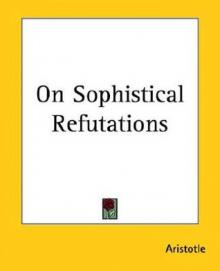 On Sophistical Refutations
On Sophistical Refutations The Categories
The Categories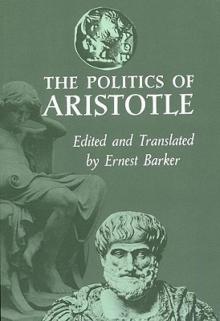 The Politics of Aristotle
The Politics of Aristotle Nicomachean Ethics
Nicomachean Ethics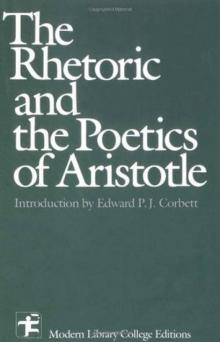 The Rhetoric & the Poetics of Aristotle
The Rhetoric & the Poetics of Aristotle POSTERIOR ANALYTICS
POSTERIOR ANALYTICS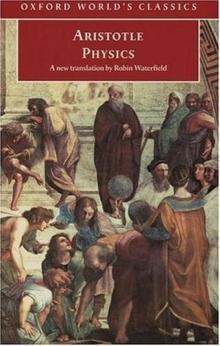 Physics
Physics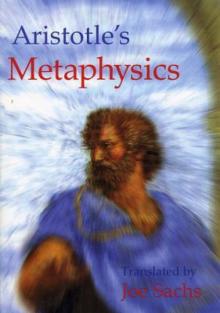 Metaphysics
Metaphysics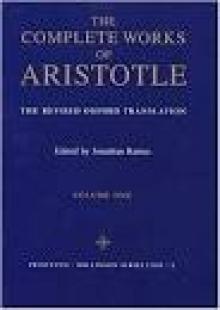 Various Works
Various Works